Symposium on Future Cities & Smart Construction held in Chongqing
The Symposium on Future Cities & Smart Construction held in Chongqing, hosted by the School of Management Science and Real Estate and organized by the Institute of Urban-rural Construction and Development of Chongqing University (Think Tank), was held in the Lecture Hall 214 of the School on January 13, 2018. The purpose of the Symposium was to shift more people's attention to the significance of future urban construction and smart construction and promote the progress of industrialization and informationization of smart city and the building industry. Topics of the Symposium included building information model, artificial intelligence, big data and informatization and industrialization, application of robots in construction engineering, AR/VR/MR and visualization, design/planning decision system, intelligent planning and design, simulation technology application in construction engineering, 3D printing technology, UAV technology application and lean construction in construction engineering.
11 experts and researchers from Western Sydney University, Purdue University, Hong Kong University, Hong Kong University of Science and Technology, Tongji University, Huazhong University of Science and Technology, CCT Technology Holdings Limited, Glodon and TH Sware showed up at the event upon invitation and delivered keynote speeches. More than 200 government officials and entrepreneurs from the building and real estate fields participated in the Symposium.
Yu Xiaobin, Chief Economist of Chongqing Municipal Urban and Rural Construction Commission, Meng Weidong, Vice President of CQU, Hu Xuebin, a standing member of CPC CQU Committee, and Head of the Publicty Department of CQU, Yuan Wenquan, Head of the Office of Social Science Research of Chongqing University, appeared at the Symposium. Liu Guiwen, Dean of the School of Management Science and Real Estate, chaired the Symposium. Meng Weidong, Vice President of CQU, delivered a speech at the Symposium. Vice President Meng Weidong expressed his appreciation of the influence of the School of Management Science and Real Estate and the entire Faculty of Built Environment in the building industry and academic community. Meng called for Chongqing University to make active contribution to the AI-based and information-based transformation of the building industry of Chongqing in the era of information-based and AI-based development of the building industry. Meng pointed out that current urgent need is for Chongqing University to cooperate with Huawei and Alibaba, and seek for new disciplinary growth points of the Faculty of Built Environment. At last, he wished the Symposium a great success. After the speech, officials and honored guests at the Symposium had a group photo taken in front of the building of the School of Management Science and Real Estate.
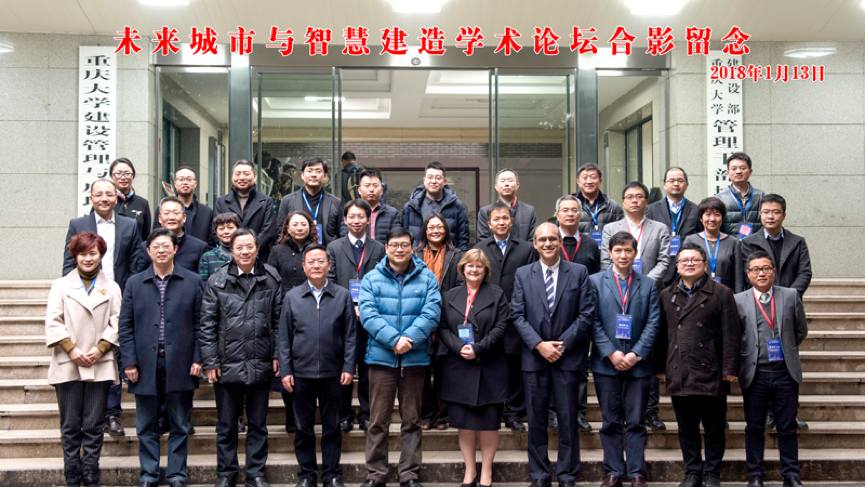
Group photo
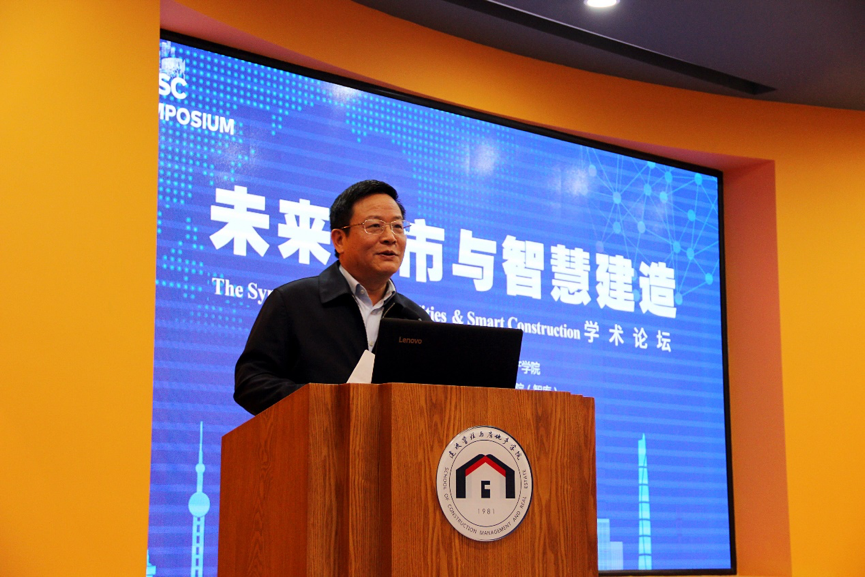
CQU Vice President Meng Weidong is delivering a speech
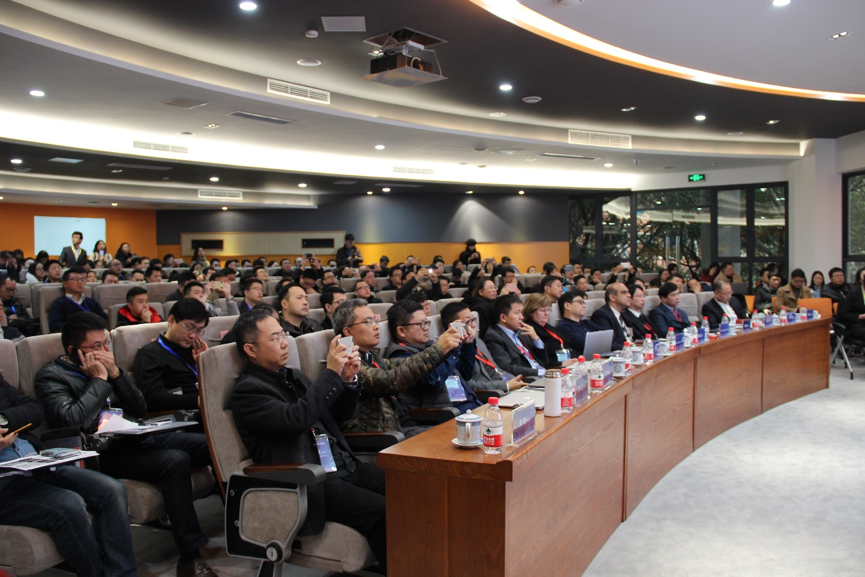
Picture of the scene of the event
After that, Kerry London, Vice Dean of the School of Computer Engineering and Mathematics of Western Sydney University, delivered an academic speech titled Enabling Advanced Construction Technologies Smart Cities. In his speech, Professor Kerry London held that the the boarder of "construction" should extend to include "smart city". According to Prof. Kerry, as the development of cities is digital-driven, for smart city construction, OSM collaborative training package should be used to improve employee skills, optimize team size and structure and cope with conflicts of interest. Prof. Kerry London studied the model through the innovative use of role network theory, and gained an understanding of and analyzed the hindering and driving factors in the collaboration of higher levels of smart city construction, and made contributions to the theoretical development of inclusive digital collaboration practice model. His speech won roars of applause of experts and researchers at the event.
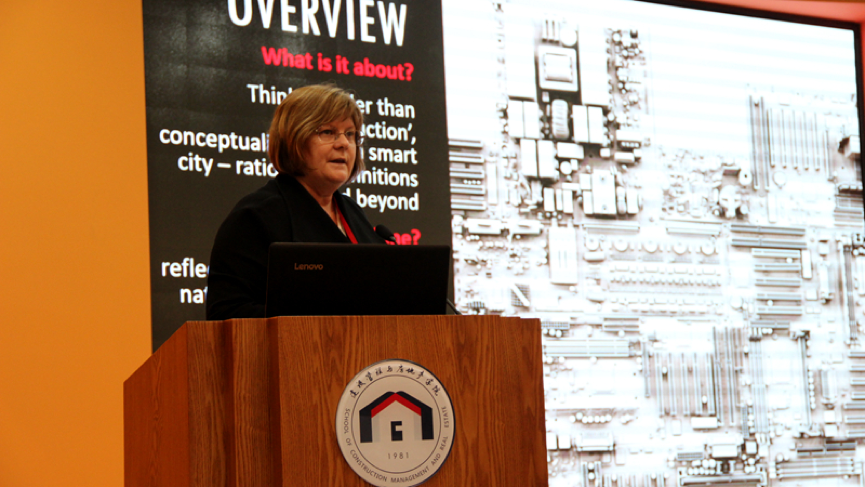
Professor Kerry London, Vice Dean of the School of Computer, Engineering and Mathematics of the Western Sydney University, is delivering a speech
Luo Hanbin, Vice Dean of the School of Engineering and Mechanics of Huazhong University of Science and Technology, shared the long-term experience in complicated underground construction of Wuhan metro under the title Intelligent Safety Management of Construction. In view of the actual safety blind areas and safety management difficulties encountered in the complicated underground construction of the metro, Professor Luo Hanbin, taking into account the five business relations of safety management, developed the automatic identification of construction safety risks of metro stations based on construction drawings, the portable sensitive Internet of Things monitoring system for the safety of hoisting blind areas in underground construction, and the intelligent new technology of automatic identification of unsafe behaviors of workers on the construction site based on machine vision. In addition to that, Luo further explained the future research orientation in many aspects, such as the quality detection of tunnel shield segments, the intelligent evaluation of shield cutter wear and the identification of other unsafe behaviors in the construction site, and provided a new perspective for the practical application of intelligent construction in engineering management.
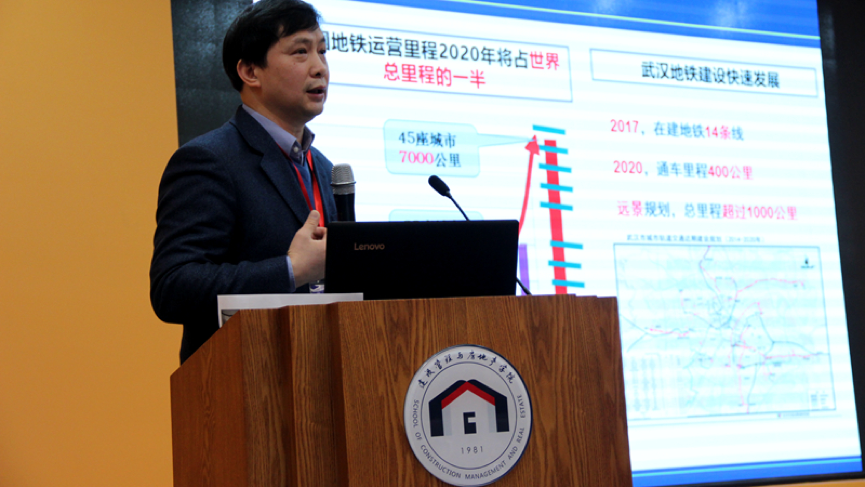
Prof. Luo Hanbin, Vice Dean of the School of Engineering and Mechanics of Huazhong University of Science and Technology, is delivering a speech
Immediately after that, Mr. Fan Zesen, Chief Architect of CCT Technology Holdings Limited, delivered a speech titled Integrated Design Theory of Prefabricated Buildings and Practice of Intelligent Construction. Mr. Fan Zesen held that system integration was the core of integration of prefabricated building, and put forward the development idea of integration of prefabricated building that includes "one body and two wings". Fan pointed out that intelligent construction was the development trend of integration of prefabricated building, and that building of digital concept was the development direction of the future. Mr. Fan Zesen showed the practical projects of integration of prefabricated buildings already completed by CCT Technology Holdings Limited, and the online and offline coordinated platform for integration of prefabricated buildings inside CCT Technology Holdings Limited, which realized the "three-all BIM application" that involves all members, all disciplines and all process.
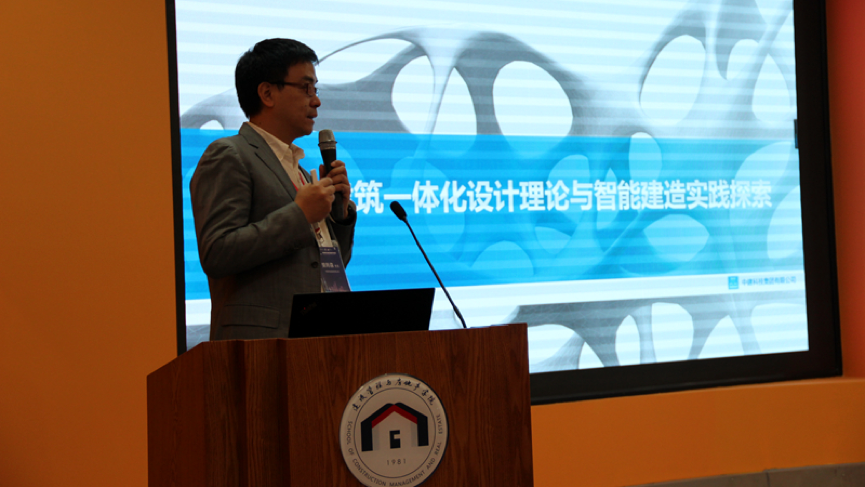
Fan Zesen, Chief Architect of CCT Technology Holdings Limited, is delivering a speech
At 11:00 am, after a short tea break, Wang Guangbin, Vice Dean of the School of Economics and Management of Tongji University, delivered a speech titled Characteristics of Intelligent Construction Paradigm and Thoughts on Related Research Field. In view of the advanced manufacturing industry in modern times, Prof. Wang Guangbin pointed out that the trend of intelligent construction in the future would be in-depth integration and innovation of digital technologies and physical projects. He gave a detailed analysis of intelligent construction process and framework based on model technology from three dimensions, including working environment, construction process and production object, and pointed out that product informatization and industrial informatization were the key links in improving the information processing function, promoting the optimization and reorganization of resource elements, and realizing the industrial upgrading and the paradigm change of the building industry.
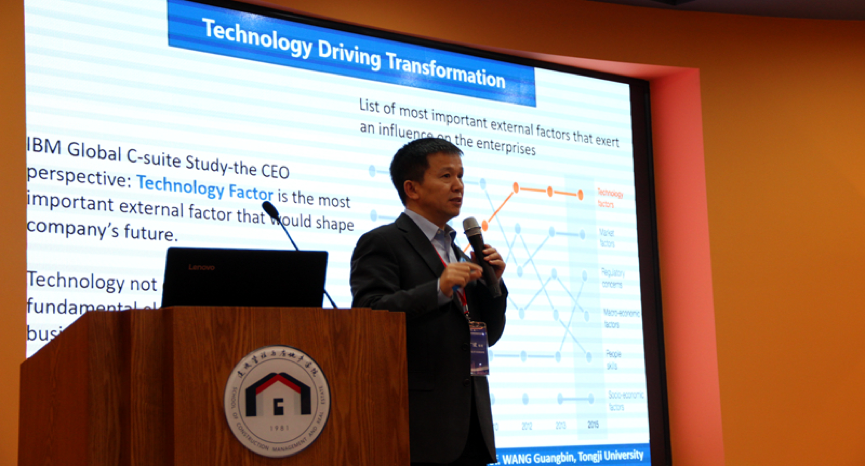
Wang Guangbin, Vice Dean of the School of Economics and Management of Tongji University, is delivering a speech
After that, Lyu Weisheng, Vice Dean of the Faculty of Architecture of Hong Kong University, delivered a speech titled Focusing on the "General Goal" and Starting with the "Details" for Development of Intelligent Construction---A Case Study of Intelligent Construction. Associate Prof. Lyu focused on the "big" of the cloud word of smart construction, and put forward the strategy to start with "small", i.e., smart construction objects (SCO). Lyu demonstrated the extraordinary performance of the product in the customization and scalability of smart construction and showed the latest SCOs product i-Core, which had won many awards, in a physical way. After that, he introduced its applications in logistics and supply chain management, occupational health and safety (OHS) management, power switch control, and prospective big data analysis for equipment management, which sparked strong interest of the attendants.
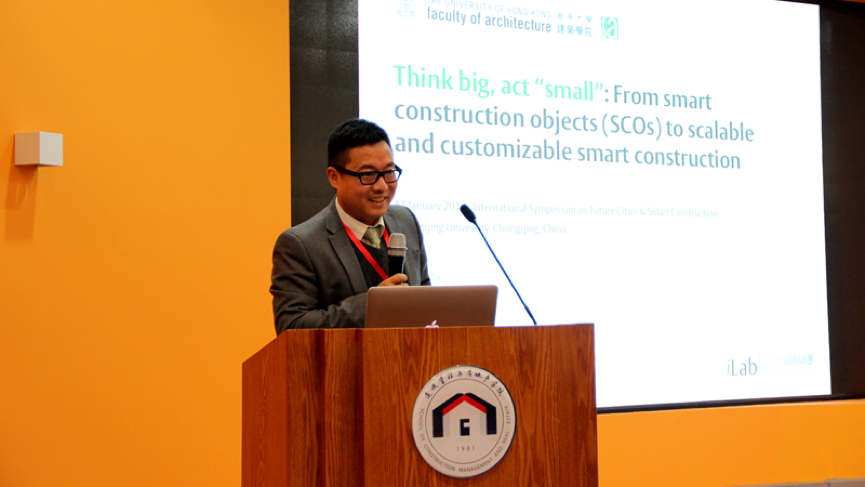
Mr. Lyu Weisheng, Vice Dean of the Faculty of Architecture of Hong Kong University, is delivering a speech
After that, Liu Guiwen, Dean of the School of Management Science and Real Estate of Chongqing University, expressed thanks to the honored guests present, and showed his expectations for the speeches to be delivered by the keynote speakers in the afternoon.
The second half of the Symposium kicked off on 2:30pm. Makarand Hastak, Dean of the Construction Engineering and Management of Purdue University, delivered a speech titled Intelligent Planning Unit of Future City and Smart Construction. Professor Hastak put forward for the first time the philosophy of intelligent planning unit (IPU). IPU refers to breakdown of the physical objects in a building environment and the interaction process into different levels, including IPU planning (including strategic positioning and planning design), IPU application (including reproduction and combination) and IPU network (including interaction and refinement). Under the modularized scale, the project effect could be improved by refining and controlling the IPU accumulated knowledge to different complex levels, so as to provide timely service and accurate information for decision makers to make better decisions. He pointed out that by raising the IPU of construction projects to the community and city levels, the functional module of intelligent planning unit of information physical integration would be able to provide sufficient information support and reference for decision-making regarding problems that would emerge in the urban intelligent construction in the future.
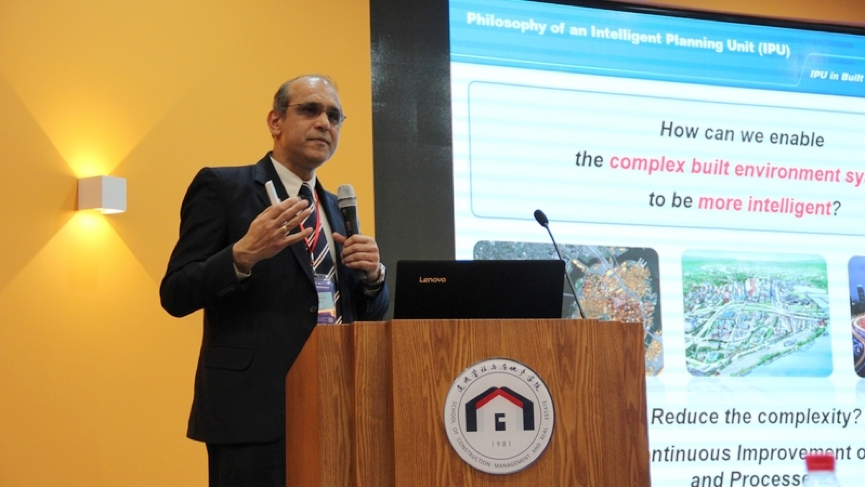
Makarand Hastak, Dean of the School of Construction Engineering and Management of Purdue University, is delivering a speech
After that, Prof. Yuan Feng from the School of Architecture and Urban Planning of Tongji University delivered a speech titled A Study on Intelligent Construction Process of Building Robots. In his speech, Prof. Yuan Feng gave an introduction to the modeling method, solution method and some structural optimization software used by his team to achieve the goal of minimum mass and maximum stiffness in structural optimization design. After that, Yuan Feng showed some video clips of the substantial achievements his team had made in application of building robots in intelligent construction. Now we have already entered the era of artificial intelligent and robots are likely to make the world colder; but Prof. Yuan showed the different possibilities of fabricated buildings in the era of robots.
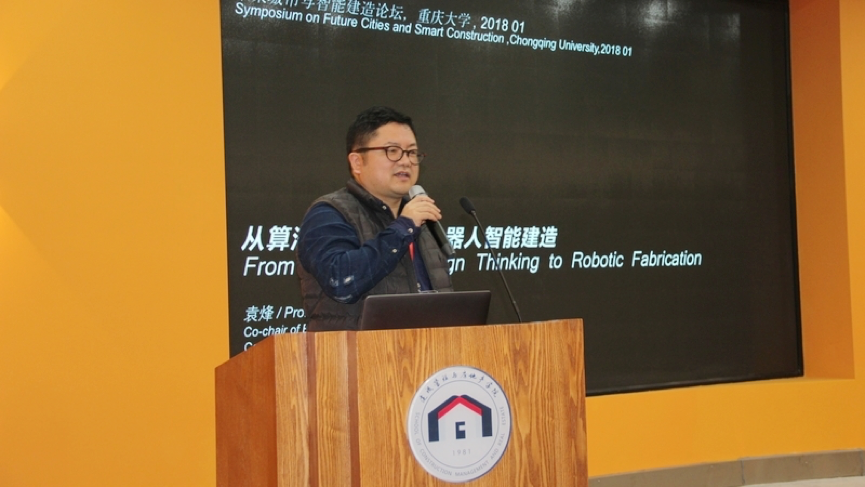
Prof. Yuan Feng from the School of Architecture and Urban Planning, Tongji University, is delivering a speech
Immediately after that, Liu Gang, Chief Business Architect of Glodon Software Co., Ltd. and President of Glodon Research Institute, delivered a speech titled Transformation and Upgrading of Building Industry Driven by Digital Buildings. During his speech, Liu Gang expounded on the digital transformation path of the building industry from three aspects, namely, digital strategy, digital technology and digital action, at three levels, i.e., industry, enterprise and project, and put forward the goal of digital transformation to promote the improvement of industry supervision and service level, spur the innovation of enterprise management and business model, and lead the upgrading of the entire process of the project. Finally, the participants should work together to build an ecological platform from the above three aspects and three levels to expedite the digital transformation and upgrading of the building industry. Liu Gang said that digital transformation was an inevitable trend of the building industry, which was calling for transformation and upgrading. Given such a context, the key foundation of success of a project lies in the integration of "digital building" with digital technology and building industry, which is also the core engine of innovation, transformation and upgrading of the building industry.
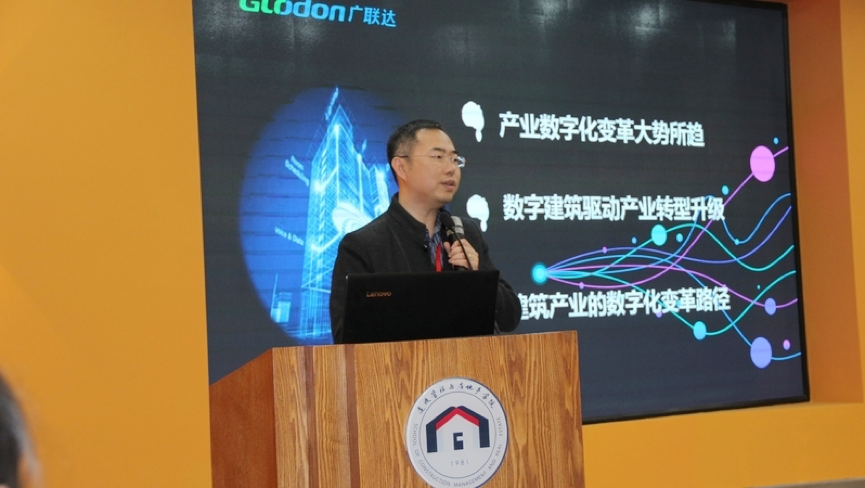
Liu Gang, Chief Business Architect of Glodon Software Co., Ltd., is delivering a speech
Associate Prof. Jack Cheng from the Department of Civil and Environmental Engineering of Hong Kong University of Science and Technology delivered a speech titled BIM, loT and AI---Making a Smart City Smarter. At the beginning of his speech, Jack Cheng answered questions as to why a city needs to be smart, and what necessary qualities are required to be a smart city, and concluded that IT is the key technology for building a smart city; after that, Jack Cheng gave an introduction to the relevance of 3 information technologies including BIM, IoT and AI to smart city and their application, and stressed how the support of information technologies would be necessary for construction of smart city in the future, to collect basic data, build the data network and solve other problems. He pointed out that cities in the future would be data-driven and more intelligent, and more reliant on innovative technologies.
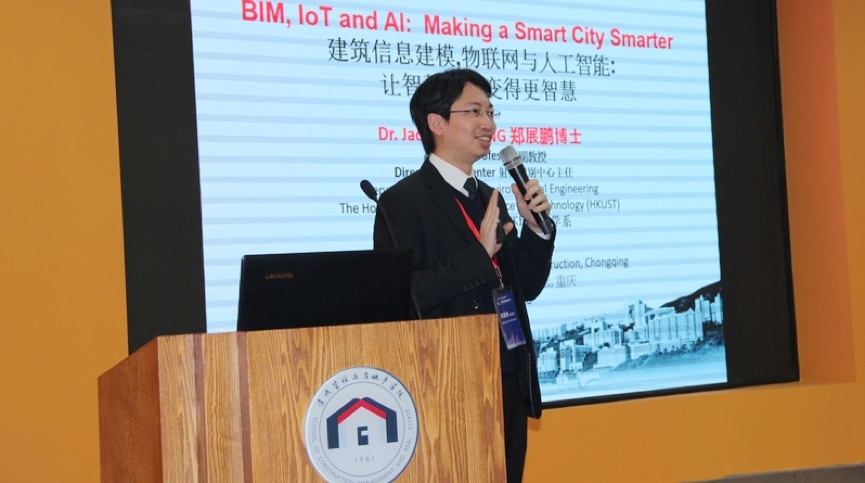
Associate Prof. Jack Cheng from the Department of Civil and Environmental Engineering of Hong Kong University of Science and Technology is delivering a speech
After that, Mr. Zhang Lijie, Senior Vice President and Technical Director of TH Sware, delivered a speech titled From BIM to CIM: Ushering in the Transformation of Urban Construction, Operation and Management Mode in China. In his speech, Zhang Lijie shared examples of application of PPP in informatization projects and the application of BIM and CIM in related projects, and emphasized that BIM was an important measure to quantitatively evaluate whether PPP mode is a cost-effective substitute of the traditional investment and operation mode of the government to provide public service projects. Then he went through the software products of TH Sware, which provide both tool software and BIM project management platform, so as to strengthen the key path of BIM implementation. After that, he brought up the idea of building a CIM platform based on 3D GIS (geographic information system technology) and BIM technology to build a new model of urban asset management and intelligent operation in the future. At the end of his speech, Zhang said that with integration of BIM data into Internet technology, GIS, big data management and other technologies, smart city would no longer be a dream.
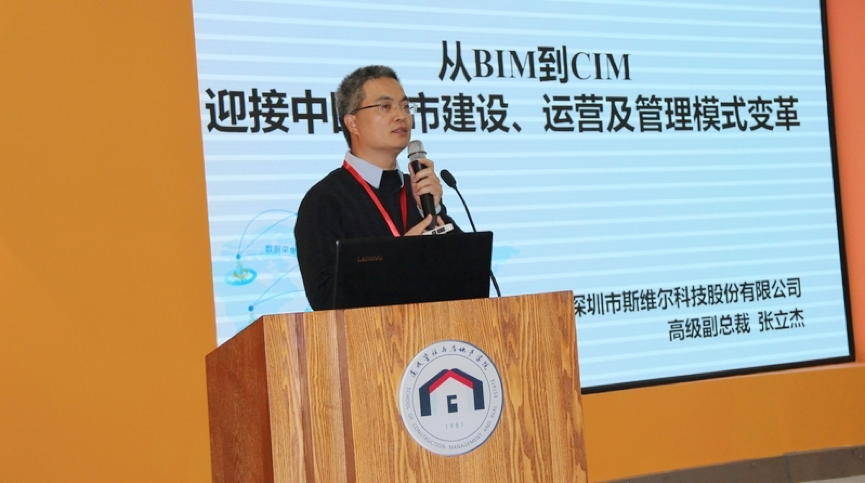
Mr. Zhang Lijie, Senior Vice President and Technical Director of TH Sware, is delivering a speech
The last speaker at the Symposium was Prof. Liu Guiwen, Dean of the School of Management Science and Real Estate, Chongqing University. The title of his speech was Change in Labor Cost and Information Technology Innovation Are Redefining the Building Industry. In his speech, Liu brought forward the idea of reducing the use of labor force through scientific and technological approaches, so as to cope with the challenges brought by the great growth potential of labor cost in China. According to Liu, the reform of construction technology informatization and management informatization is guiding the shift of the building industry from an extensive one to an intensive one. Specifically, technology is redefining the design method, construction technology and management method of the building industry, so as to upgrade the urban smart construction through the upgrading the building industry in the future.
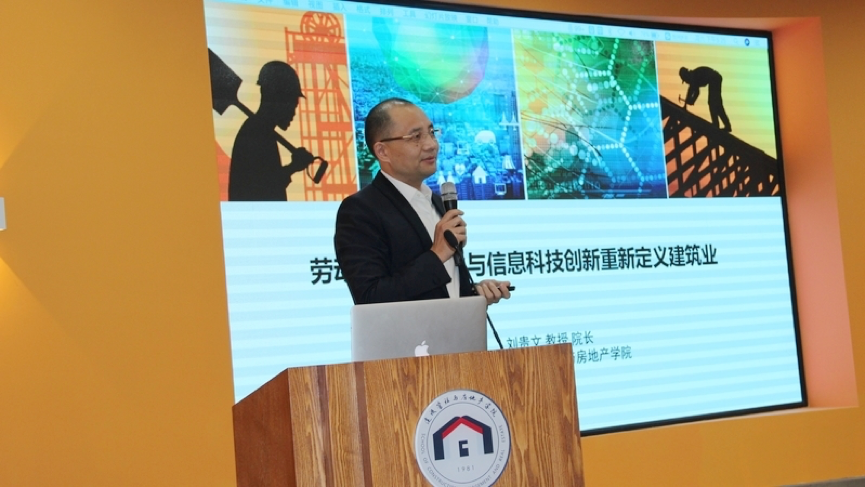
Liu Guiwen, Dean of the School of Management Science and Real Estate of CQU, is delivering a speech
The Forum was brought to a successful end at 6:00pm amidst roars of applause. Attendants of the Symposium had discussion over problems in the process of application of information technology in urban development and building industry related to hot topics like Future Cities & Smart Construction and their solutions. It is of substantial significance for strengthening the construction of related disciplines, cooperation and exchange and talent nurturing of the School, and brought Future Cities & Smart Construction under the spotlight, so as to boost the development of smart cities, building industrialization and building informationization.